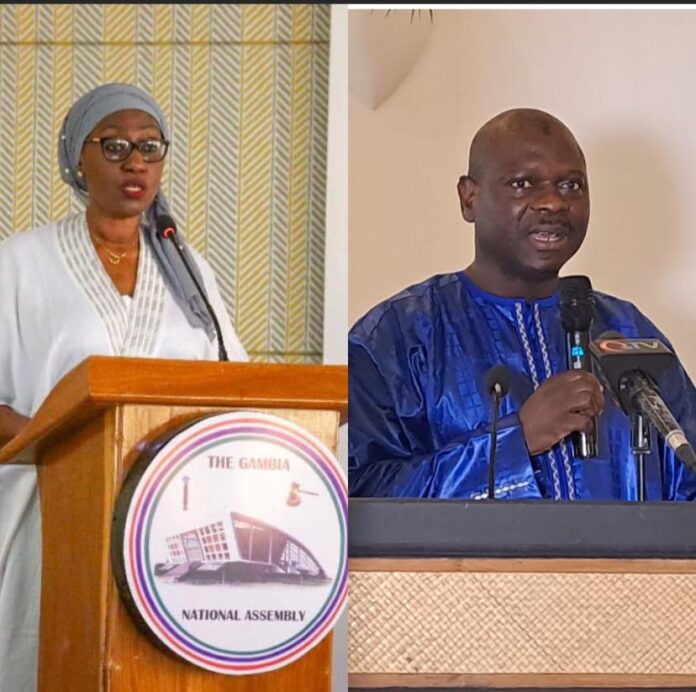By Mama A. Touray
After the Minister of Finance and Economic Affairs, Seedy Keita, submitted the first quarter budget performance report to the National Assembly, Tuma Njie, the National Assembly Member for Banjul South, expressed concerns about the report.
Njie urged the Minister to provide a more detailed budget performance analysis in the future. While speaking, he appealed to Minister Keita to prepare a breakdown of the report instead of just a summary.
“I will appeal to the minister [to] send the breakdown of the individual ministries’ expenditure so that we can monitor as per our committees to make sure that what they were allocated and approved has been given accordingly,” she said
Njie stated that during each bilateral meeting, ministers express that they have underperformed in their ministries because the allocations are not provided on time.
She also mentioned that since it is now the second quarter and the minister is presenting the report for the first quarter, it would have been more effective if he had combined the reports for both the first and second quarters, along with a detailed breakdown of expenditures for the various ministries.
Njie further emphasised that this is a summary report. As per the provision, the minister should present a comprehensive statement on the entire implementation and monitoring process, rather than just a summary report.
“For a whole government, we are in the sixth month of the year, to come and give us a report in seven pages is concerning. I think we expect a thorough statement next time. I am appealing to the minister when he comes, let him give us a thorough statement because some of us are not financially learned; so, we need an explanation in everything,” she said.
Njie, however, praised the minister’s effort in putting the spending in a table form, naming it “a consolidated table, quarter one actual and quarter two budget, fine, which is excellent, but we need a breakdown.”
“If you say actual, each minister is allocated a budget. We need to know, for example, how the Ministry of Gender is struggling: what they have been allocated, how far they have implemented it, what is allocated, and the challenges. This way, we can have mitigating factors to help them,” she told the minister.
Njie continued, “You don’t have to wait until the end of the year to tell us that our women are suffering because we did not have money. Please give us a full report so that we can have a real understanding of how our people are suffering, enabling us to help them suffer less.”
Njie also referenced the standing order, which states that the minister should come at least once every session to report to the assembly.
“I recall that for the 2024 budget, even though it has been passed, he did not report to us. He needs to monitor every government expenditure whenever and wherever. So, we are appealing that he comes at least every session. We had an extraordinary session, and he did not give us a report, and it states that every session, including an extraordinary session, is a session,” Njie said.
Meanwhile, Tuma expressed concern about total tax revenue, stating, “The fact that the total revenue for taxes has gone up and the implications are not good for our citizens because it means that the citizens are paying more in taxes. The standard of living is also very expensive, and the fact that the non-tax revenue has underperformed is also not good because it means that there is a lack of foresight and initiative within this government to ensure that there are alternatives.”
She added, “So the only means of revenue is to milk the citizens of this country, which I think we should try to change so that we can provide our people with a better standard of living.”
In response to the concerns raised by Njie, Minister Keita said, “Our understanding of the standing order request is that the oral intervention and, in such a type of financial intervention, is not a financial statement presentation. This is very typical even in the corporate world, where you give quarterly briefings, and in this presentation format, you don’t blow it out to pages.”
Keita explained further that quarterly presentations are done in June, which, he said, is not yet due. “Normally, you present the June quarter in the months of July and August, but we will endeavour during ordinary sessions of the assembly to come and brief the assembly on the implementation and monitoring of the budget.”
Responding to the tax collection issue, Keita explained, “In terms of tax collection, claiming that we are taxing the Gambian people more, I think that’s quite the opposite of what has happened. If you look at the income tax bracket this year, we have moved the tax bracket base starting from D24,000. Previously, if your earnings were up to D24,000, then tax would kick in, but we have moved that to D36,000.”
Keita said they have provided every Gambian citizen or employee with an additional D12,000 in tax-free income. “So, it doesn’t represent that we are taxing people. The Sub-Saharan African average tax-to-revenue GDP ratio is 16%; we are at 10-11%, which means we are below the Sub-Saharan Africa average in terms of tax burden.”




